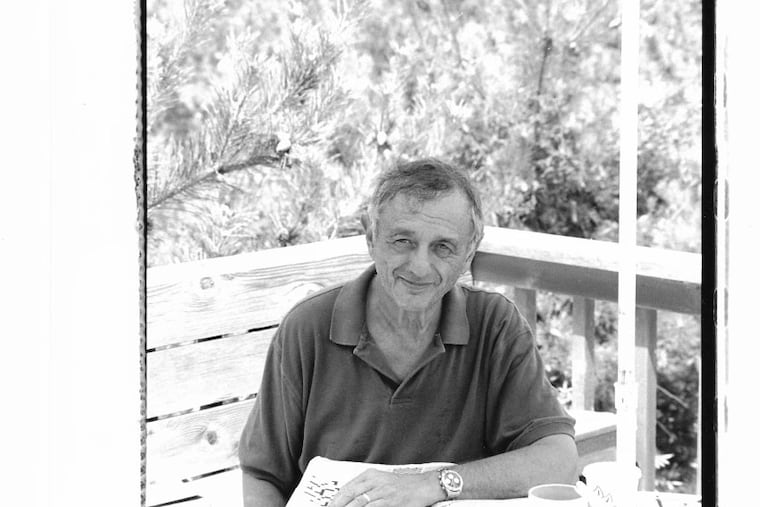Eli Pritzker, businessman and neighborhood activist in Center City, dies at 93
Mr. Pritzker briefly practiced law before realizing he could do more good as a businessman. He helped any neighbor or community group that asked him.

Eli Pritzker, 93, of Philadelphia, the son of Ukrainian immigrants who rose to become a businessman and neighborhood activist, died Saturday, Dec. 12, of heart disease at his home.
He was born in the Bronx to Ida and Samuel Pritzker, who had fled a pogrom in Ukraine. Before leaving, the couple burned their house to make it appear they had died.
At age 11, he moved with his mother to West Philadelphia after his older brother, Martin, died of a congenital heart defect. His parents separated.
Mr. Pritzker graduated from West Philadelphia High School and had enrolled at Temple University when he was drafted to serve in World War II. Out of consideration for his single mother, Mr. Pritzker was allowed to serve his Army duty stateside.
He earned a bachelor’s and a legal degree from Temple. He practiced law at the Philadelphia firm Newman & Master. “He thought he was going to save the underdog,” daughter Nina Pritzker-Cohen said.
But soon after taking up the law, he and two partners were offered first option to buy Penn Electric, his late uncle’s electrical supply business. ”In the end, he felt he could be more successful helping people as a businessman,” his daughter said.
The business grew from a Philadelphia store at 60th and Market Streets to a chain of supply houses with 200 employees in Pennsylvania and New Jersey.
Mr. Pritzker had a book filled with the names of sources who could supply hard-to-find parts. Customers like Peco took advantage of those contacts. During one holiday weekend late in his career, Peco needed a part to keep a 50-year-old transformer running. Mr. Pritzker tracked the item to a warehouse in Kansas.
But the owner was in church. So Mr. Pritzker asked local police to find the man and have him open the warehouse.
“This is an emergency, thousands of people in Philadelphia are in danger of losing power if we can’t get this part right away,” he told police. The part was shipped, and power stayed on in the city.
As the chain grew, Mr. Pritzker kept the West Philadelphia store as a base from which to help employees and neighbors. Mindful of his parents’ early struggles, he helped immigrants buy homes and become citizens.
“He strove to use whatever resources he had available, as a prominent business owner, to lift everyone up with him,” his family said in a tribute.
He applied the same dedication to his Center City neighborhood, making himself available to neighbors and community groups. When the Lombard Swim Club was in danger of being razed in 1979, he persuaded the owners to sell it to the members at a loss.
He met with every bank in the city to provide a $290,000 loan. He finally had success with Continental Bank, moving all of Penn Electric’s business accounts over to seal the deal. The loan was repaid by members who bought shares in the club.
“Without him, including his financial, intellectual, and leadership resources, the club would not exist,” said board member Janice Fanning Madden.
His stewardship surfaced again when neighbors feared a trash-to-steam plant planned near Graduate Hospital. He hired a lawyer who persuaded the city to scrap the plan.
Mr. Pritzker was block association president of the 2000 block of Delancey during the early 1980s, when muggings plagued Center City. He installed the brightest street lamps available on the block.
“He never broadcast his contributions, always giving out of the kindness of his heart with no expectations in return,” his family said.
In the 1990s, the Penn Electric partners broke up. Mr. Pritzker kept the business going with another partner, and then alone. But it was hard to achieve the same success. The times were also changing. His book of providers could not compete with parts readily available on the internet.
Despite the downturn in business, he continued his good works, sometimes to the detriment of his finances. “He was always a salesman, not an accountant,” his daughter said.
Besides his daughter, he is survived by his wife, Helen Pratt Pritzker; a son, Michael; stepdaughters Suzanne Davis and Elizabeth Pratt; eight grandchildren; and nieces and nephews. His first wife, Lois Pritzker, died earlier.
Services and interment were private.
Memorial donations may be made to any charity working to relieve hunger or homelessness.